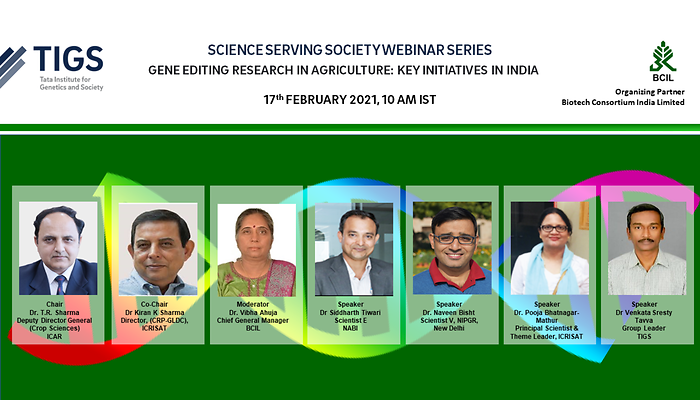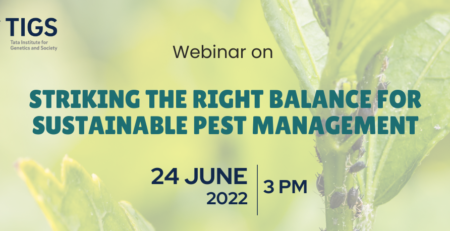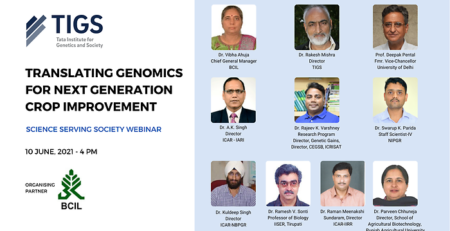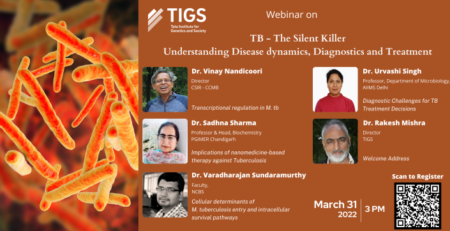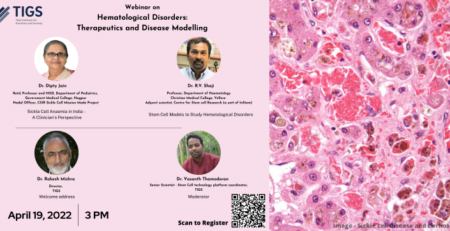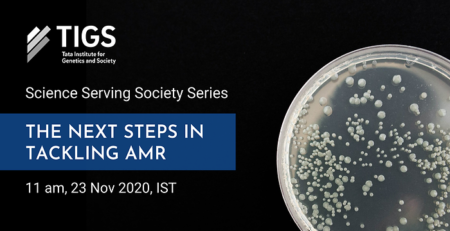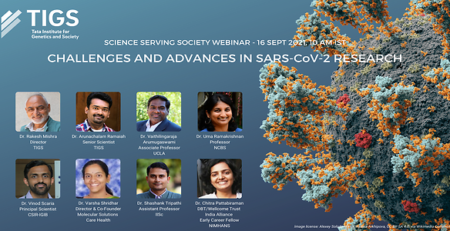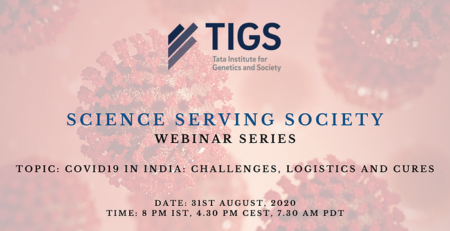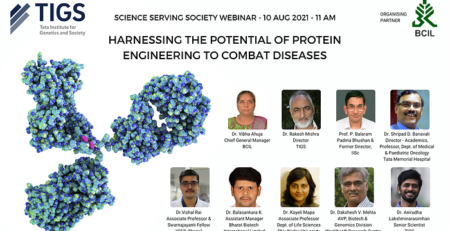Webinar recording
Highlights
The fifth edition of the TIGS Science Serving Society series aired on 17 February 2021 with a webinar on ‘Gene Editing in Agriculture: Key Initiatives in India’.
The event featured talks by leading scientists in the country who are involved in addressing various productivity issues in some important crops and in improving nutritional quality in some by using genome editing technology. This is in continuity to the conversation we initiated with our previous webinar “Gene Editing for Agriculture, Society and Sustainable Development: Prospects and Perspectives” in December 2020.

Dr Vibha Ahuja, Chief General Manager of Biotech Consortium India Limited (BCIL), the organizing partner of the webinar, welcomed the speakers and attendees and moderated the proceedings.
The opening remarks were given by the panel Chair, Dr. T.R. Sharma, Deputy Director General (Crop Science), Indian Council of Agricultural Research, who shared his optimism about the draft guidelines formulated by the Department of Biotechnology for regulating genome editing in plants, since they convey the Government of India’s commitment in exploring new technologies for crop improvement.
Dr. Kiran K Sharma, Director, CGIAR Research Program on Grain Legumes and Dryland Cereals (CRP-GLDC), International Crops Research Institute for the Semi-Arid Tropics (ICRISAT) was the Co-Chair for the discussion, and he briefly spoke about how new technologies like CRISPR-Cas9 can allow for more precise, safe and cost-effective genome editing to improve crop varieties.

The speaker presentations began with Dr. Siddharth Tiwari, Scientist-E, National Agri-Food Biotechnology Institute (NABI), talking about his team’s work on gene editing in bananas for improving nutritional quality. He highlighted the scope of genome editing in clonally propagated crops, while providing a balanced view of the merits and certain demerits and possible solutions to overcome them in this type of approach. He also spoke about the importance of developing biofortified banana varieties that are rich in beta carotene and vitamin A.

Dr. Pooja-Bhatnagar Mathur, Principal Scientist & Theme Leader, ICRISAT, discussed gene editing in grain legumes and dryland cereals (GLDC crops), with an emphasis on enabling technologies for trait development and targeted breeding, current and upcoming trait pipelines, as well as ensuring continuity and convergence between conventional and new methods of crop improvement.

Dr. Naveen Bisht, Staff Scientist IV, National Institute of Plant Genome Research (NIPGR), discussed gene editing in oilseeds for improving productivity, disease resistance and oil quality of the Brassica family of oilseeds. He also commented on the promising results demonstrated by CRISPR-Cas9 genome editing for improving plants/crops across the world.

Dr. Venkata Sresty Tavva, Group leader, Tata Institute for Genetics and Society (TIGS), brought gene editing in rice to the fore and discussed the research efforts being undertaken at TIGS to create rice varieties that are resistant to biotic and abiotic stresses. His talk also touched upon various methodologies that can be used to improve the rice crop, such as vector construction, tissue culture and transformation and genetic engineering.
This webinar discussed the benefits of gene editing technology and how it could prove to be a gamechanger for sustainable agricultural practices. The panel concluded on a hopeful note with the convening scientists expressing their optimism in seeing regulatory harmonisation for enabling the research and deployment of gene edited crops in India.
Note: Please note that some of the data presented during this webinar have not been published yet. If you would like to know more about their work or cite this data in a publication, please contact the speakers directly.

